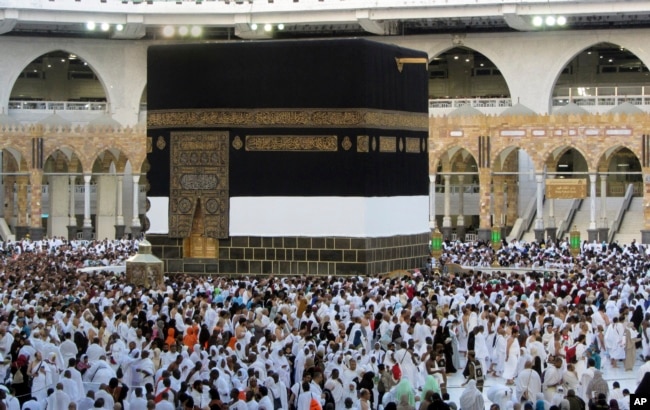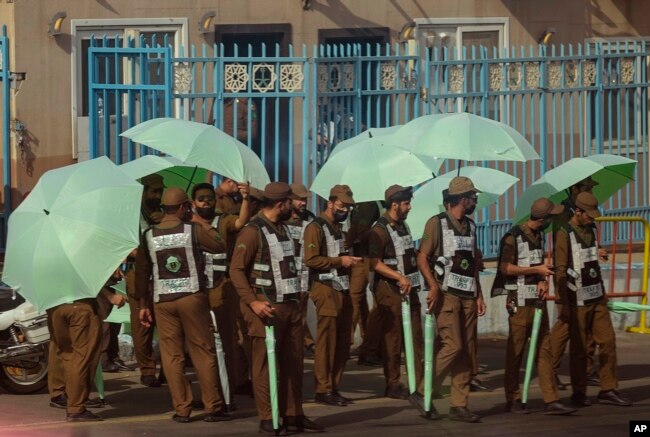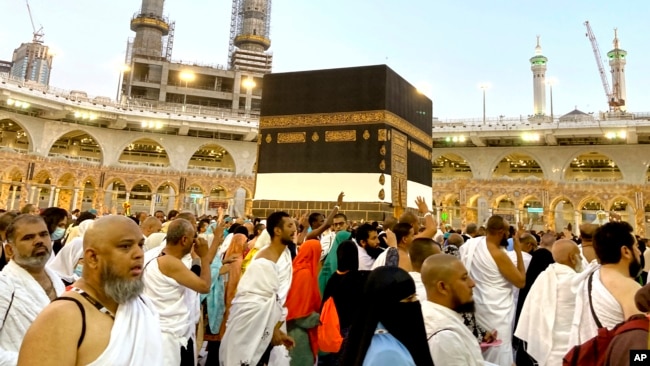まさに、異文化との遭遇であります!!はい!!
聴きながら、なんかわかんないんですが、ドキドキ、ワクワク!!
教徒の熱狂もさることながら経済的効果も相当なもの!!
VOAで英語を、世界を、学びましょう!!
サウジアラビア、ハッジに100万人を見込む(和訳)
Saudi Arabia Expects 1Million for Hajj
July 07,2022
イスラム教の聖地であるサウジアラビアのメッカに、水曜日、100万人のイスラム教徒が集まり、ハッジと呼ばれる宗教的な訪問を毎年行っています。COVIDの流行により、過去2年間は外国人旅行者の入場を禁止するなど、ハッジが厳しく制限されていました。
今年は、サウジアラビア政府は国外からの約85万人のイスラム教徒にpilgrimage巡礼を許可しています。
巡礼は木曜日から始まります。
ハッジは通常、世界最大の集会の一つです。2019年は215万人のイスラム教徒が参加しました。
今年集まる人は、65歳未満でCOVID-19の予防接種を受けることが義務付けられています。また、渡航後72時間以内にウイルス検査で陰性でなければなりません。巡礼者は、オンライン抽選システムを通じて数百万人のリクエストから選ばれます。
サウジアラビア当局は2日、聖地を視察し、巡礼者を受け入れる準備ができたと述べました。
COVID-19が2020年に初めて広まった後、サウジ当局はすでに国内に住んでいるわずか1000人の巡礼者の参加を許可しました。昨年も同様に、ハッジはサウジアラビアに住む完全なワクチン接種を受けたイスラム教徒6万人に制限されました。この制限は、イスラム世界の多くの人々に衝撃を与えました。
宗教的な巡礼は、パンデミック以前は国内で年間120億ドルを調達していました。巡礼はサウジアラビアの経済活動全体の中で石油に次いで大きな割合を占めています。
サウジアラビアでは現在、1日に約500人のCOVIDの新規感染者が出ています。国民の約70%がこのウイルスに対するワクチンを接種しています。先月、政府は屋内でのマスク着用義務やその他の予防措置を一部終了しました。
メッカの巡礼者は、過去2年間のように顔を覆うものを着用したり、社会的に距離を置いたりする必要はありません。しかし、巡礼者がハッジを終える際に歩くイスラム教の聖なる建物であるカーバに人が触れることは依然として禁止されています。
イスラム教の聖典であるコーランには、身体的・経済的に可能なすべてのイスラム教信者は一生に一度は巡礼するべきだと書かれています。5日間かけて行われます。
ハッジは、イスラム教徒が約1400年前に預言者ムハンマドが歩いたと信じている道をたどります。また、聖書に登場する以前の預言者たちの足跡をたどるとも考えられています。
Saudi Arabia Expects 1 Million for Hajj
One million Muslims are gathering in the Islam’s holiest city Mecca, Saudi Arabia, Wednesday, for the yearly religious visit called hajj. The COVID pandemic severely restricted the hajj in the past two years, including a ban on foreign travelers.
This year, the Saudi government is permitting about 850,000 Muslims from outside the country to make the pilgrimage.
It begins Thursday.
The hajj is usually one of the world’s largest gatherings. Two-and-one-half-million Muslims took part in 2019.
Those gathering this year are required to be under 65 years old and vaccinated against COVID-19. They also must test negative for the virus within 72 hours of travel. The pilgrims are chosen from millions of requests through an online lottery system.
Saudi officials inspected the holy site on Wednesday and said they were ready to receive pilgrims.
After COVID-19 first began spreading in 2020, Saudi officials permitted just 1,000 pilgrims already living in the country to attend. Last year, the hajj was similarly restricted to 60,000 fully vaccinated Muslims living in Saudi Arabia. The restrictions shocked many in the Muslim world.
Religious pilgrimages raised $12 billion yearly in the country before the pandemic. The pilgrimages account for the largest percentage of Saudi Arabia’s total economic activity after oil.
Saudi Arabia is currently seeing about 500 new cases of COVID a day. About 70 percent of the country has been vaccinated against the virus. Last month, the government ended indoor mask requirements and some other prevention measures.
Pilgrims in Mecca are not required to wear face coverings or be socially distanced, as they were during the past two years. However, people are still barred from touching the Kaaba, the Islamic holy building that pilgrims walk around as they complete the hajj.
The Quran, Islam’s holy book, says that all Islam’s followers who are physically and financially able should make the pilgrimage once in their lifetime. It takes place over five days.
The hajj follows a path that Muslims believe their prophet Muhammad walked almost 1,400 years ago. It is believed to follow the footsteps of earlier prophets named in the Bible.
Words in This Story
pilgrimage — n. a journey to a holy place
negative — adj. not showing the presence of a particular germ, condition, or substance
lottery — n. a system used to decide who will get or be given something by choosing names or numbers by chance
mask — n. a covering for your face or for part of your face
prophet — n. a member of some religions who delivers messages that are believed to have come from God


